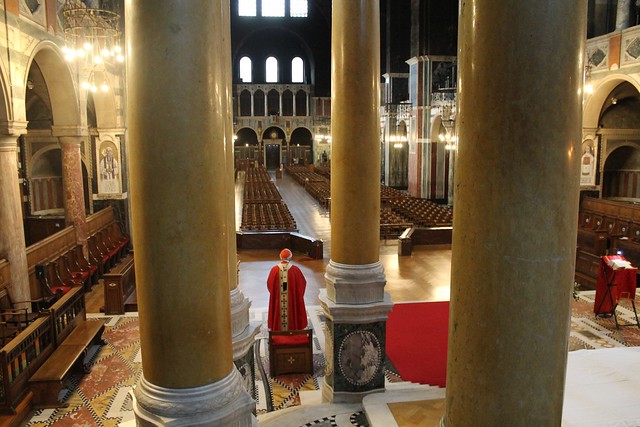When last did silence lie over South London as it has in the past few weeks? The Seventies? The Sixties? The Fifties? Only the brief ‘stillness of the solemn air’ after heavy snowfall, as in February 2009, seems comparable, but even then I am not sure there was ever a hush so thick as that which now descends on London at night, not just in the street outside, but in all the roads around, and the roads beyond them, for miles and miles and miles. The slick, insufferable, incessant, suburb-saturating, sempiternal seething of traffic has vanished. Some reports suggest that the number of cars on the road has gone down by two thirds to its lowest level for sixty years; I could well believe this. Now, four weeks into the national quarantine, I am noticing the volume of traffic creeping up again, but it is still bearable for now. Any relief is welcome.
 |
| Council notice on the Common. |
Then there is the weekly eight o’clock round of applause for doctors and nurses, which has been kept up vigorously in our street. A friend reports that the clapping in his village at the fringes of London is lessening every week, but round near me (much further in) I am sure it is growing, if anything. The neighbours add to the clamour by hammering on pots and pans, or by thumping their wheelie bins, while passing cars sound their horns. Then after a minute or so, we down tools, wave to each other or call in greeting across the street, and withdraw. Some might scoff at this, but I feel this is just the sort of custom that many parts of Britain, mine included, have long lacked.
It occurs to me that this pandemic may well cement the National Health Service into place as the established religion of Britain. This is entirely understandable: our debt to doctors and nurses is now partly due in a currency other than that in which we pay our taxes. But it may cause problems in the future if, as tends to happen with any large institution, the NHS comes to need reform of some sort, and public feeling produces misplaced resistance, legitimate changes being mistaken for undue interference. On the other hand, the strength of public faith in the NHS will also serve as protection against any short-sighted erosion or thinning out of its services by its overseers. Maybe, though, we will soon have worse to worry about than either of these problems. (And I would also observe quietly that there are some needs which even the NHS cannot be expected to answer.)
Local pavement decoration
|
I have not altogether forgotten about the world outside my parish, though. One gloomy piece of news that has almost been lost amid the coronavirus coverage is the continued collapse of marriage in Britain: the number registered in 2017 was a new record low, and of these the proportion of ceremonies with any religious dimension was also the lowest ever recorded: 22%. It may sound blunt to say this, but this is the sign of a civilisation that scarcely believes in the future at all, let alone in lasting love.
But there has been cause for good cheer, such as the birthdays of Benedict XVI (ninety-three) and H.M. the Queen (ninety-four). And Pope Francis has also given an interview here — https://www.thetablet.co.uk/features/2/17845/pope-francis-says-pandemic-can-be-a-place-of-conversion- — with something to hearten and challenge everyone, as is characteristic. For example:
It’s true, a number of governments have taken exemplary measures to defend the population on the basis of clear priorities. But we’re realising that all our thinking, like it or not, has been shaped around the economy. In the world of finance it has seemed normal to sacrifice [people], to practise a politics of the throwaway culture, from the beginning to the end of life. I’m thinking, for example, of pre-natal selection. It’s very unusual these days to meet Down’s Syndrome people on the street; when the tomograph [scan] detects them, they are binned. It’s a culture of euthanasia, either legal or covert, in which the elderly are given medication but only up to a point.And —
Yet the elderly continue to be our roots. And they must speak to the young. This tension between young and old must always be resolved in the encounter with each other. Because the young person is bud and foliage, but without roots they cannot bear fruit. The elderly are the roots. I would say to them, today: I know you feel death is close, and you are afraid, but look elsewhere, remember your children, and do not stop dreaming. This is what God asks of you: to dream (Joel 3:1).
What would I say to the young people? Have the courage to look ahead, and to be prophetic. May the dreams of the old correspond to your prophecies.I hope all readers, and their friends and families, are safe and well.
Cardinal Vincent Nichols (Archbishop of Westminster) celebrates Mass for National Health Service workers, carers, the sick and their families, in Westminster Cathedral.
Photo from https://www.flickr.com/photos/catholicwestminster/49812472648/ (IMG_3880, 23rd April 2020).




No comments :
Post a Comment
Please add your thoughts! All civil comments are warmly welcomed.